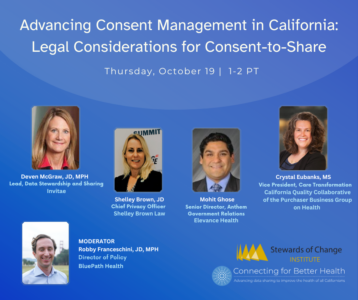
Creating a uniform process around consent to share information is critical to simplifying workflows, decreasing barriers to health care access, and improving health equity. A significant component of consent is understanding the legal landscape surrounding authorizations to share information.
In California, the State Health Information Guidance (SHIG) and CalAIM Data Sharing Authorization Guidance provide summaries of federal and state privacy laws that apply to data sharing, including an analysis of laws governing criminal justice, housing, and nutrition program data. However, many providers still hesitate to exchange data due to the multitude of laws and conflicting interpretations.
On October 19, 2023, Connecting for Better Health partnered with Stewards of Change Institute and the California Health Care Foundation to produce the second in a four-part series titled Advancing Consent Management in California. This webinar focused on discussing steps forward in aligning interpretation of consent law statewide.
How can we make it easier for providers who may not have access to legal resources to share information safely? To answer this question, Crystal Eubanks, vice president of care transformation at the California Quality Collaborative (CQC) of the Purchaser Business Group on Health (PBGH), stated that providers and workflows cannot support different processes for differently insured or uninsured patients. To improve the flow of information through organizations of all sizes, the state should standardize the consent management process for all patients, regardless of who is paying for their care. Eubanks suggested that privacy waivers for all Californians, rather than just Medi-Cal patients, would be a beneficial first step.
Michelle Brown, who provides privacy and legal counsel for 2-1-1 San Diego and Serving Communities Health Information Organization (SCHIO), shared that if all stakeholders could agree upon and adopt into legislation a standard consent form that would be valid for most use cases, this could go a long way towards making all providers more comfortable with data sharing.
Deven McGraw, lead for data stewardship and data sharing at Invitae, asserted that uncertainty is the killer that causes providers and organizations to default to the most conservative position: not sharing data. Regulators at every level need to provide an example of what a sufficient consent form and process might look like. More clarity and an ongoing effort to issue FAQs and training on common circumstances is paramount; otherwise, consent will remain a major barrier to data sharing.
Mohit Ghose, senior director of government relations at Anthem, expressed that ultimately, data has to get to the right place at the right time to be effective. Cross-agency coordination and a standard consent form would allow California to achieve its goal of true population health management.
As research reveals that social drivers of health and behavioral health influence physical health, clarifying consent to share even the most sensitive types of information becomes necessary for all providers. Additionally, as McGraw revealed: standardizing and streamlining the consent process for all Californians should not be left solely to the government; there is a role for every stakeholder to play.
View the webinar recording here.

